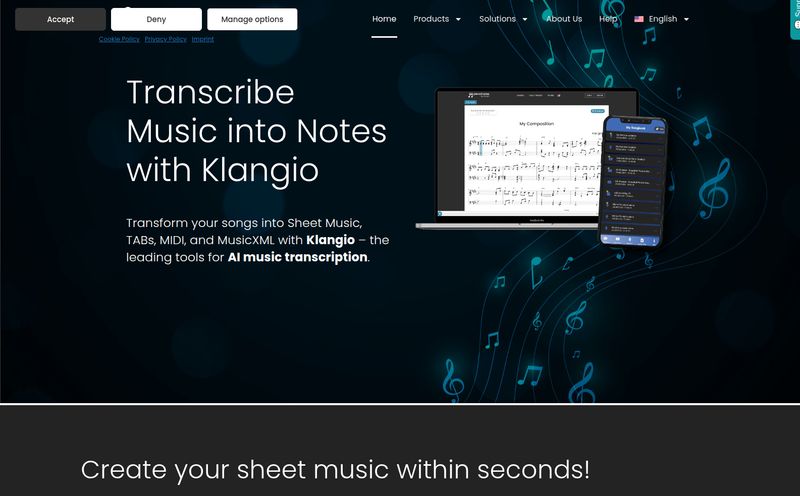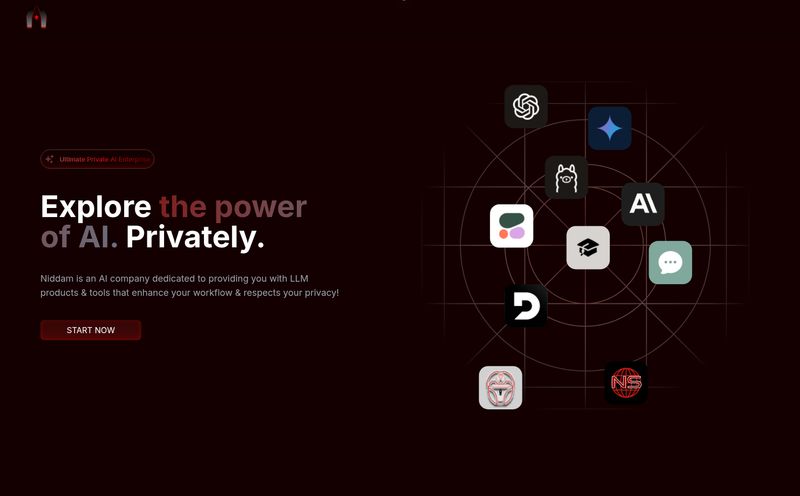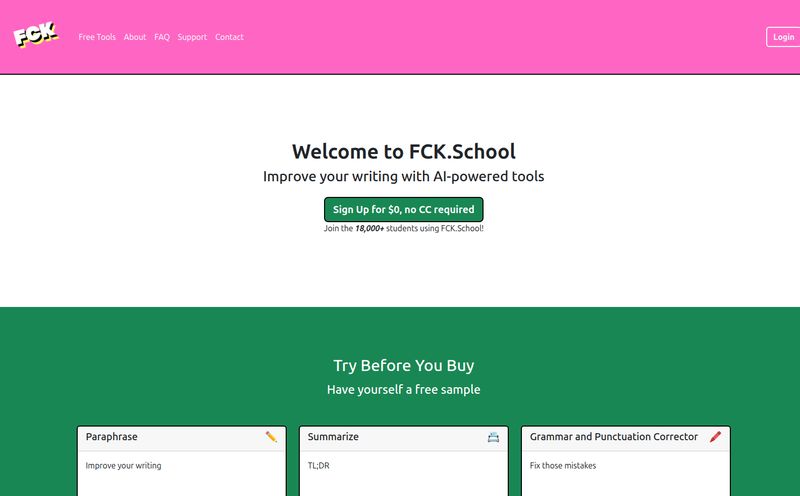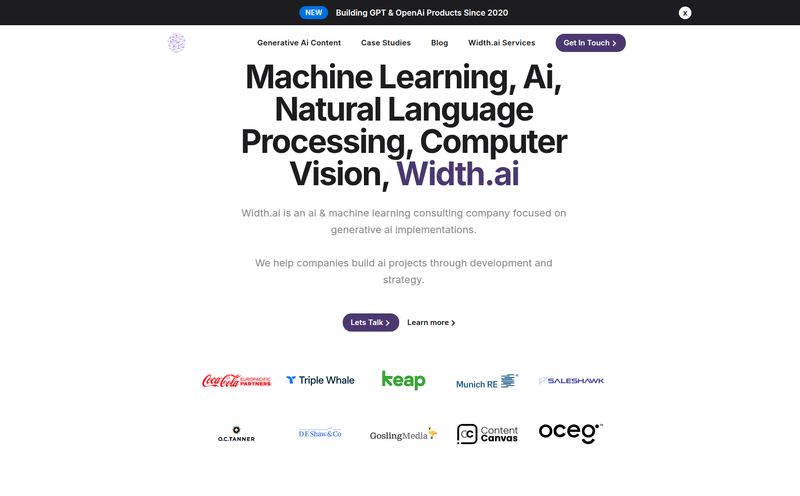Sales meetings. You love them, you hate them. They're the lifeblood of any B2B company, but man, can they be a black box. You walk out of a call feeling great, but then... nothing. The deal stalls. Or you have a new rep who’s brilliant but makes the same small mistake on every demo. How do you scale the good stuff and stamp out the bad without cloning your top sales manager and sitting in on every single call?
I’ve been in the traffic and revenue game for years, and I’ve seen countless platforms promise to solve this. They all want to be the next big thing in sales enablement. Most just end up being glorified call recorders with a clunky UI. So when I came across Goodmeetings, an AI-powered platform for revenue teams, I was skeptical. But I’ve gotta say, after digging in, what they're doing feels… different. It feels smarter.
It’s not just about recording calls. It’s about understanding them. It’s like having a film crew and a sports analyst for every single one of your sales calls, breaking down the game tape so you can actually improve. Let's get into it.
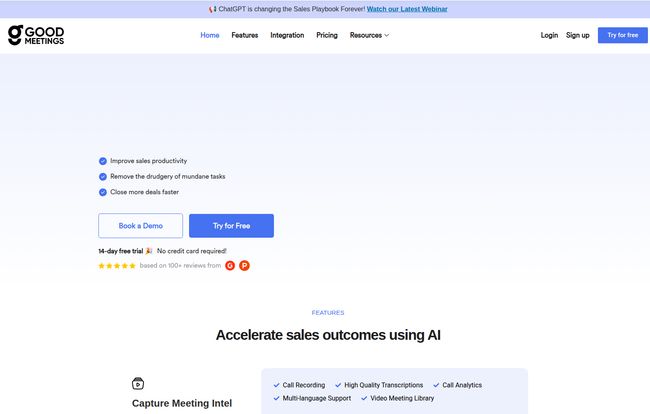
Visit Goodmeetings
What Exactly is Goodmeetings? (And Why Should You Care?)
At its core, Goodmeetings is an AI Meeting Insights and Automation Platform. That’s a mouthful, I know. In plain English? It joins your sales calls (on Zoom, Google Meet, etc.), records and transcribes them, and then uses AI to pull out the most important moments. Think of it as your team’s collective memory, but with a super-smart search function and a built-in coach.
For years, we’ve relied on CRM notes—which are only as good as the person typing them—and hazy recollections. Goodmeetings aims to replace that with objective, searchable reality. It’s for high-performance revenue teams, meaning sales and customer success folks who are tired of guessing what works and want to start knowing. This is about moving from “I think the call went well” to “The data shows the customer’s buying intent increased by 20% after we discussed this feature.” That’s a pretty big shift.
The Features That Made Me Look Twice
A lot of platforms have a long list of features. What matters is whether they actually solve a real problem without creating a new one. Here’s what stood out to me in the Goodmeetings arsenal.
More Than a Recording: AI-Curated Reels and Summaries
This is the headliner. We’ve all had to scrub through a 60-minute recording just to find that one 30-second clip where the client mentioned their budget. It’s a nightmare. Goodmeetings automatically creates a “reel” of the key moments: competitor mentions, pricing discussions, next steps, customer objections. Instead of a full movie, you get the trailer with all the best parts. The platform also generates what they call “human-level summaries” and action items. This alone could probably save every sales rep an hour a day on admin and record-keeping. That’s an hour they can spend, you know, selling.
The In-Call Nudge: Your AI Wingman
Okay, this is cool. And a little sci-fi. Goodmeetings offers “in-call nudges.” These are real-time prompts that pop up during a live meeting, visible only to your sales rep. Did the rep forget to mention a key case study? Did they talk for too long without asking a question? The AI can gently nudge them back on track. I’ve seen so many junior reps (and even some senior ones!) get flustered and forget their training. This feature acts as a real-time safety net. It’s not about robotic scripts; it’s about subtle, helpful guidance right when it matters most. This is a game-changer for onboarding and consistency.
Coaching That Isn’t a Drag: Playlists and Analytics
Sales coaching is often subjective and not very scalable. A manager can’t be everywhere at once. Goodmeetings turns call recordings into coachable assets. Managers can create playlists of “perfect discovery calls” or “how to handle the pricing objection” for new hires to study. They can leave time-stamped comments on a rep’s call recording. And it’s all backed by analytics. You can see who on your team has the best talk-to-listen ratio or which talking points correlate with higher win rates. It takes the guesswork out of performance management.
Let's Talk Brass Tacks: The Goodmeetings Pricing Puzzle
Alright, the elephant in the room: pricing. If you go to their website, you won’t see a neat little table with prices. You’ll see two plans, Professional and Business, and a big friendly button that says “Get a Quote.”
I know, I know. Some people hate this. But in the B2B SaaS world, especially for tools this integrated, it's pretty common. It usually means the price depends on your team size, usage, and the specific integrations you need. It’s not a one-size-fits-all product.
Here’s a quick breakdown based on their plan comparison:
| Feature | Professional Plan | Business Plan |
|---|---|---|
| Core Functionality | All the basics: Recording, Transcription, AI Summaries, Playlists. | Everything in Pro, plus more advanced features. |
| Coaching | Standard coaching features. | Advanced coaching, including "coaching by humans" (sounds intriguing). |
| Analytics | Standard Analytics Dashboard. | Custom Analytics Dashboards. |
| Support | Standard Support. | Dedicated Customer Success Manager. |
| Best For | Teams getting started with conversation intelligence. | Larger or more mature revenue teams needing deep customization and support. |
My take? The quote-based model suggests they're focused on making sure you're a good fit before you sign up, which can actually be a good thing. It prevents smaller teams from buying a sledgehammer to crack a nut.
The Real-World Impact: Can It Actually Boost Your Numbers?
A fancy tool is only as good as its results. Goodmeetings throws some pretty bold numbers around on their site – a 45% increase in win rates, a 40% reduction in sales ramp-up time, and a 52% cost saving in onboarding. Are these numbers real?
Let's connect the dots. A 40% faster ramp-up makes sense. Instead of shadowing calls for weeks, a new hire can binge-watch a playlist of your team's greatest hits. They learn what ‘good’ looks like from day one. An increase in win rates? Also plausible. When you can analyze what your top performers are doing differently and then coach the rest of the team on those specific behaviors, the whole team gets better. It's the whole principle of moneyball, but for sales conversations. The time saved from automated note-taking—they claim a 35% productivity boost—directly translates to more time for prospecting and closing. It's not magic; its just smart leverage.
My Honest Take: The Good and The Not-So-Good
No tool is perfect. After looking at everything, here’s my straightforward opinion. The biggest advantage of Goodmeetings is its focus on being an insights engine, not just a recording library. The AI reels and in-call nudges are genuinely innovative features that address real-world sales challenges. For any sales leader who feels like they lack visibility into their team's conversations, this could be a revelation. It transforms coaching from a soft skill into a data-driven science.
On the flip side, the lack of transparent pricing might be a turn-off for smaller businesses or those who just want to quickly try something out. You have to be willing to engage in a sales process to even find out the cost. Also, like any powerful tool, it requires buy-in. It needs to be integrated into your workflow—your calendar, your CRM, your team's habits—to deliver value. It’s not a magic wand you can just wave at your revenue problems. It requires a commitment to a more data-driven sales culture.
So, Is Goodmeetings the Real Deal?
I started out skeptical, but I’m leaving impressed. Goodmeetings seems to have carved out a really smart niche for itself. It’s not trying to be a CRM or an all-in-one project manager. It does one thing—analyzing sales conversations—and it appears to do it exceptionally well.
If you're a sales leader at a growing company and you're frustrated by inconsistent performance, long ramp-up times, and a general lack of visibility into what’s really happening in your sales calls, then yes, I think you should absolutely book a demo. This could be the tool that helps you find teh patterns in the noise and turn your good salespeople into great ones.
It’s not for everyone. If you’re a solopreneur, it's probably overkill. But for a revenue team that’s serious about performance, Goodmeetings looks like a very, very smart investment.
Frequently Asked Questions
1. How does Goodmeetings integrate with other tools?
Goodmeetings is designed to plug into your existing sales stack. It integrates with popular calendars like Google Calendar and Outlook, video conferencing tools like Zoom, Google Meet, and MS Teams, and CRMs to automatically sync call data and notes.
2. Is Goodmeetings difficult to set up?
From what I can tell, the setup process is fairly straightforward. You connect your calendar and conferencing tool, and the Goodmeetings bot will start automatically joining and recording your scheduled meetings. The Business plan also includes a dedicated Customer Success Manager to help with tailored onboarding.
3. How is Goodmeetings different from competitors like Gong or Chorus?
While they operate in the same conversation intelligence space, Goodmeetings seems to put a strong emphasis on real-time assistance (the in-call nudges) and creating highly curated, digestible content (the AI reels) to fight information overload. The focus is heavily on actionable insights and scalable coaching, rather than just building a massive archive of calls.
4. What kind of customer support is available?
They offer 24/7 customer support for all users. The Business plan takes it a step further by providing a dedicated Customer Success Manager for more personalized, strategic support.
5. Is my call data secure with Goodmeetings?
Security is a major focus for them. The platform mentions advanced security measures and GDPR readiness. For businesses handling sensitive customer information, this is a critical aspect, and it seems they've taken it seriously.
6. Do I have to pay for a full year upfront?
Their website mentions both annual and monthly billing options are available, so there's likely some flexibility depending on the plan and commitment you choose.
